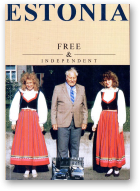- Галоўная старонка
- Што новага
- Кнігі
- Аўдыёкнігі
- Пэрыёдыка
- Радыёперадачы
- Музыка
- Відэа
- Пляны
- Каталёг БГТ
- Каталёг EEDC
- Крама
- Каталёг Скарынаўкі
- Каталёг MiOKB
- Прыватны каталёг
- Беларускія аўтары
- Выдаўцы і выдавецтвы
- Выдавецкія сэрыі
- Беларускія эміграцыйныя калекцыі
- Афарызмы
- Нашыя банэры
- Пра нас
- Партнэры
- Пошук/ Каталёг
- Архіў навінаў

|

|
Estonia
Free & Independent
Месца выхаду: Tallin
Дата выхаду: 1994
Выдавец: Estonian Encyclopaedia Publishers, Ignar Fjuk Architects, Ltd.
Памеры: 128 s.
Катэгорыя: Этнаграфія; Турыстыка; Геаграфія
Copyright © 1994 by Estonian Encyclopaedia Publishers, Ignar Fjuk Architects, Ltd.
Кнігазбор: EEDC — бібліятэка Усходнеэўрапейскага дэмакратычнага цэнтру, ul. Proletariacka 11, Białystok (папяровы асобнік)
Інвэнтарныя нумары: EEDC — [2371]
Сыгнатура: VIII.2.Est
Estonia emerges. It emerges swiftly as a country moving into Europe and fitting Europe into its own practices and thinking. The most visible effect is its rapid democratization and marketization, compared to other former Eastern Bloc countries. The underlying reason is that Estonia always was part of Europe in its Western sense. It used the Latin rather than the Cyrillic alphabet and was Catholic, then Protestant rather than Greek Orthodox. Fifty years of Soviet Russia's occupation imposed a heavy new layer but could not obliterate the Western substrate. Whenever Russia or Serbia consider adopting Western ways they must go outside and give up parts of themselves. In contrast, when Estonia or its Baltic neighbours (Latvia and Lithuania) adopt Western ways, they only have to reach deeper and actually recover parts of themselves. (fragment)
Каталёг: EEDC
Варта пазнаёміцца:
Estonia
Historia, współczesność, konflikty narodowe
Darski Józef
Książka ta należy do serii poświęconej krajom Europy Środkowej i Wschodniej. Celem prac tego cyklu jest ukazanie wewnętrznych stosunków politycznych w tych krajach i stosunków między państwami i narodami Europy Środkowej i Wschodniej. Informacje z dziedziny literatury, kultury, geografii czy gospodarki zamieszczono w książkach tej serii o ile wiążą się ściśle z polityką. Autor położył nacisk na sprawy aktualne, a w tym na wydarzenia i k... Болей »








